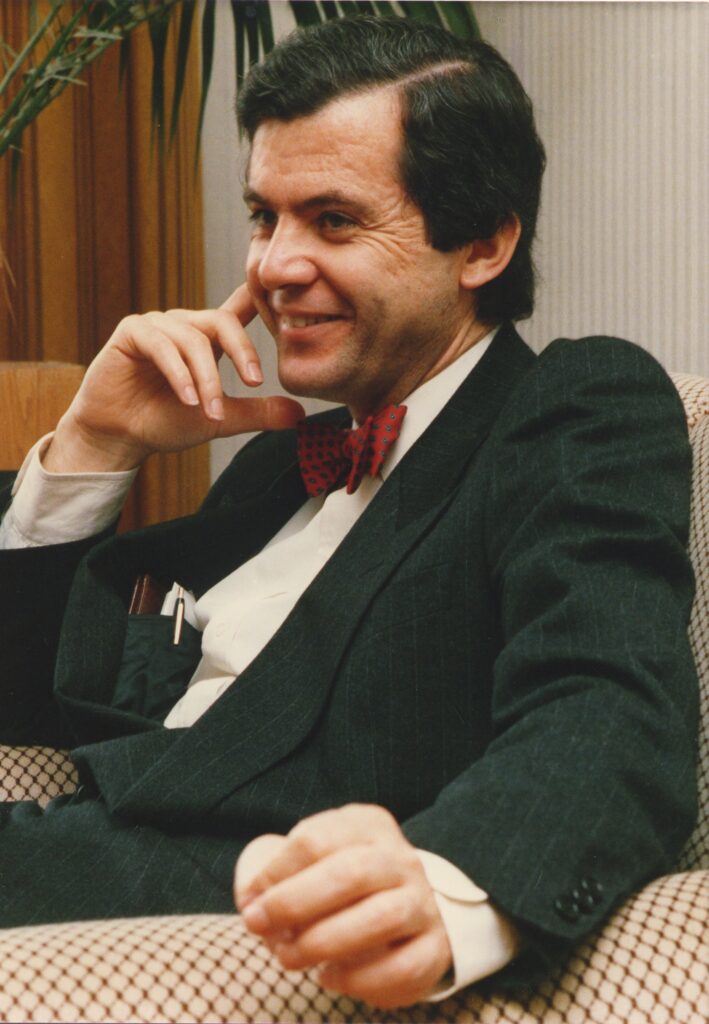
Buckley Institute Announces the Establishment of the Mark Palmer Fellowship Fund
The Buckley Institute is pleased to announce the establishment of the Mark Palmer Fellowship Fund, established in memory of Ambassador Mark Palmer ’63 by his widow, Dr. Sushma Palmer. Each year, the fund will support the participation of one Yale student in the Buckley Institute’s Washington, D.C. Fellowship.
“We are honored to have the support of the Palmer family and their vote of confidence in the long-term success of the Buckley Institute,” said Founder and Executive Director Lauren Noble ’11. “The Mark Palmer Fellowship Fund will help provide Yale students with the insight and connections they need to follow Palmer’s footsteps in public service and the defense of democracy around the world.”
“It is my privilege to establish a Mark Palmer Fellowship at Buckley in memory of my late husband, who greatly admired William Buckley,” said Dr. Sushma Palmer. “As U.S. Ambassador to Hungary in 1989, and throughout his diplomatic career and as an entrepreneur, Mark devoted himself to promoting democratic transitions and freedom around the world. I hope that Mark’s work will serve as an inspiration to Washington, D.C. Fellows.”
Every year, the Buckley Institute brings a select group of students to Washington, D.C. for a week to meet with the key voices shaping national policy and the public debate. Participating students get an inside look at the opportunities that exist in Washington, D.C. and regularly return from the trip with a better understanding of what career path they would like to pursue after graduation. Past trips have included meetings with a Supreme Court Justice, former Cabinet Secretaries, sitting members of Congress, prominent journalists, and influential voices in the national conversation.
For more information on the Washington, D.C. Fellowship, check out the Buckley Institute website.
Ambassador Mark Palmer ’63

Ambassador Mark Palmer, a proponent of democracy and human rights, made a life-long career of fighting for democracy and human rights both inside and outside the government. He participated in the American civil rights movement, and remained active throughout his life in pursuit of better opportunities for African-Americans and other under privileged groups. Mark Palmer presided over a dramatic shift in US-Hungarian relations during his tenure as Ambassador in Hungary from 1986 to 1990, a crucial period for bringing down Europe’s communist dictators. For his contributions to assisting with the liberation of Poland, the Baltic States, and Hungary, he received awards from democratic governments and human rights organizations.
Ambassador Palmer was a U.S. Foreign Service Officer from 1964 to 1990. He served in senior policy positions in the State Department in the Nixon, Ford, Carter, Reagan, and first Bush administrations. From the outside, he worked with both the Clinton and the second Bush Administrations, helping persuade them to initiate new democracy policies, including support for the Community of Democracies and abolishing the so-called “Arab exception,” for the first time promoting democracy in the Arab world.
He served as U.S. Ambassador to Hungary from 1986 to 1990, Deputy Assistant Secretary of State in charge of U.S. relations with the Soviet Union and East Central Europe from 1982 to 1986, director of the Office of Strategic Nuclear and Conventional Arms Control in the U.S. Department of State from 1978 to 1981, and served overseas in New Delhi, Moscow, and Belgrade from 1964 to 1978. Mark was a co-founder of the National Endowment for Democracy and originator of the United Nations Democracy Fund.
Prior to joining the U.S. Foreign Service, Mark was News Assistant at The New York Times and Assistant Producer for World at Ten, WNDT-TV from 1963 to 1964.
After the fall of the Berlin Wall, in 1990 Ambassador Palmer became an investor in former communist countries. He co-founded and served as President of Central European Development Corporation (1990-1997), which built a major real estate complex at Checkpoint Charlie in Berlin. Palmer also co-founded Central European Media Enterprises in 1993, which, with local partners, financed, launched, owned and operated the first national commercial politically-independent television stations in the Czech Republic, Slovakia, Slovenia, Romania, Ukraine and Poland.
Palmer served on the boards of numerous educational, cultural, and advocacy organizations.
Palmer graduated magna cum laude, Phi Beta Kappa from Yale University in 1963 with a major in Russian Studies.
